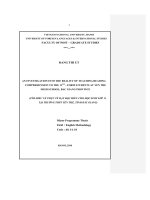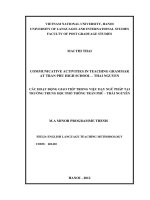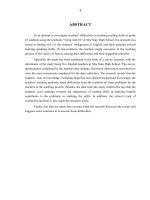How to develop listening skill at tran thoi high school
Bạn đang xem bản rút gọn của tài liệu. Xem và tải ngay bản đầy đủ của tài liệu tại đây (188.16 KB, 17 trang )
CA MAU COMMUNITY COLLEGE
FACULTY OF PROFESSIONAL TRAINING
HOW TO DEVELOP LISTENING SKILL
AT TRAN THOI HIGH SCHOOL
STUDENT’S NAME: Tran Thi Nhien
STUDENT’S NUMBER: CK1203A035
CLASS: English 2012
SUPERVISOR: Mr. Do Song Nguyen
Ca Mau, May 10
th
2013
1
ACKNOWLEDGEMENTS
After I have studied at Ca Mau Community College for 3 years, I get a lot of
helpful lessons as well as experience, and now I have a chance for practice and
writing a report. In this report, I got many difficulties. However, due to the
knowledge I have learned and the supports from many others, I could completely
finish the report.
Firstly, I would like to give faithful thanks to my supervisor –Mr. Do Song
Nguyen– who enthusiastically supported me in my report. Secondly, I would like to
give a grateful thank to my teachers who have taught me as well as my classmates
at English class 2012. Then, I would like to thank the headmaster of Tran Thoi high
school who gave me a chance to practice and do the report, the students' and the
teachers who helped me a lot in the research. I would like to thank my friends who
have offered good opinions for me to do the report.
Finally, I would like to give a faithful thank to my parents. They were always
my side and supported me of the mental and the materials so that I could finish the
report. I am very grateful to them, and I will try to study better to get my dream.
Thank you a lot
2
ABSTRACT
Although I have studied English major branch for 3 years at Ca Mau
Community College (CMCC), I still have recognized that English is a very difficult
language to study, especially to kids. At this time, I have a chance for practice and
using the knowledge that I have learned.
I have written a topic about the real situation of learning English of kids so
that I will discuss, evaluate, and then suggest some solutions for this. I chose Tran
Thoi high school to be a practical place for my research with the topic: "How to
develop listening skill at Tran Thoi high school” My report includes
main five chapters: Introduction, Literature Review, Methodology, Results and
Discussion, and Conclusion. I hope that my research will be helpful and be received
faithful comments from all of everybody.
3
TABLE OF CONTENTS
COVER PAGE
TITLE PAGE
ACKNOWLEDGEMENTS i
ABSTRACT ii
TABLE OF CONTENTS iii
LIST OF ABBREVIATION iv
LIST OF APPENDICES iv
LIST OF TABLES iv
Chapter 1: INTRODUCTION 1
1.1. Background to the study 1
1.2. Statement of purpose 1
1.3. Research questions 2
1.4. Significance of the study 2
Chapter 2: LITERATURE REVIEW 3
Chapter 3: METHODOLOGY 5
3.1. Time of the study 5
3.2. Place of the study 5
3.3. Procedure 5
3.4.Questionnare 5
Chapter 4: RESULTS AND DISCUSSION 6
4.1. Result 6
4.1.1. The questionaire 6
4.2. Discussion 7
Chapter 5: CONCLUSION 8
REFERENCES 9
APPENDIX I 10
THE SUPERVISOR'S COMMENT 11
4
5
LIST OF ABBREVIATION
Ca Mau Community College CMCC
LIST OF APPENDICES
Appendix 1: Questionnaire 19
LIST OF TABLES
Table : Table 1 student’s opinion 6
6
CHAPTER I: INTRODUCTION
1.1. Background to the study
Nowadays, English is a popular and indispensable language around the
world. People almost know English. English is taught as a compulsory subject
at schools, including primary schools. Besides, people find foreign language
centers to study. To many countries, including Vietnam, English is considered
as mother tongue, and serves a lot of things in studying as well as in working.
Even in the most development countries like the United States America, the
United Kingdom people living there still need to learn English. In Vietnam,
the event of Vietnam joining the international organizations, of Vietnam's
impressed development and regularly trading with foreign countries shows
the reason why English is being concerned a lot. However, a negative trend of
learning English that has been taking place in several recent years is to chase
movements without any concern to quality. Most people, most of the time,
take listening for granted, it’s something that just happens. It is only when
you stop to think about listening and what it entails that you begin to realise
that listening is in fact an important skill that needs to be nurtured and
developed. Listening is perhaps the most important of all interpersonal skills.
Effective listening is very often the foundation of strong relationships with
others, at home, socially, in education and in the workplace.
After I have studied in CMCC for 3 years, I have a lot of helpful
knowledge. Now, my classmates as well as I have a chance for practice.
Unlikely others, I decide to choose Tran Thoi high school to be my practicing
place, and a topic that I have written is: “How to develop listening skill at
Tran Thoi high school”
1.2. The purpose of research:
The purpose of this report finds out advantages and disvantages of
students at Tran Thoi secondary school. I can survey current situations and
may offer any useful solution to all of everybody to improve listening skill.
7
1.3 Research questions:
+ Why must develop listening skill?
+ How to develop listening skills?
1.4. Significance of the study.
We can know difficult problems in listening at Tran Thoi secondary
school.
We can find out the methods to development English listening skill.
8
CHAPTER II: LITERATURE REVIEW
In this chapter, I will present some past researches in the same
fields. There were many opinions on English teaching and learning, such
as:
- Most authors consider listening a necessary skill.according to
“Castleberry & Sherpherd, 1993, p. 36” – Effective listening occurs when
there is a high degree of correspondence between the sender’s original
message and the listener’s
Re-creation of that message.
- Rather than really listening, many of us have learned to focus our
attention on all the visible manifestation of listening. We know much more
about how to be polite than how to really take in the information that is being
presented (Ellingson, 1992, p. 41).
- Lewis (1989) explains that “repetition is the key to remembering”.
- When you acknowledge the speaker, you demonstrate your interest
and attention. Your acknowledgment encourages the speaker and actually
helps the speaker send a clearer message (Alessandra & Hunsaker, 1993, p.
59).
- Listening is interpretive process through which listeners generate
internal text which commonly differ from what they hear in unexpected ways
(Murphy. 1985) so that the listener has to put all his energy to communicate
with the text.
- According to Byrnes (1984) listening is a “highly complex problem-
solving activity”. As Byrnes said, listening is a complex activity. It needs the
listener focus to speaker. It has been hypothesized that background
knowledge and schemata plays a significant role in the comprehension of this
highly complex problem- solving activity.
- Employees with effective listening skills are more productive with
new technologies (Sypher, Bostrom & Seibert, 1989).
9
- Effective listening occurs when there is a high degree of
correspondence between the sender’s original message and the listener’s re-
creation of that message ( Castleberry & Shepherd 1993).
- Developing an awareness of the factors that affect listening ability has
been suggested as one of two keys to improving litening skills ( Nichols &
Stevens, 1957).
- When people improve their listening skills there is not only an
increase in morale, safety quality, sale and productivity but also a decrease in
unneccesary turnover and absenteeism ( Kausen, 1993, p. 5).
10
CHAPTER III: METHODLOGY
3.1 Time for the study:
- From now April 20, 2015 to May 31, 2015.
3.2 Place for the study:
- I had a direct contact and my research was done at Tran Thoi high
school.
3.3 Procedures
I gave a questionaire. The questionaire including 5 questions was
delivered to 30 students at Tran Thoi high school. I guided them how to do
this questions and suggested them to choose the suitable answer. Then, I
collected the results and gave the data from student’s answer.
3.4 Questionaires
There are 5 questions. The question form is choosing A, B, C:
Question 1: How does students’ attitude about learning listening skill?
Question 2: How often do the students practise listening skill?
Question 3: How do students study listening skill?
Question 4: What do students do to develop their listening skill?
Question 5: What are difficult problems of students in listening?
11
CHAPTER IV: RESULT AND DISSCUSION
4.1 Result
4.1.1 The questionnaire:
After investigation, I collect result from 30 students at Tran Thoi high
school. The following table include the result of question 1 to 5:
Answers
Questions
A B C Total
students % Students % students % students %
1 4 13 6 20 20 67 30 100
2 6 20 9 30 15 50 30 100
3 15 30 10 33 5 17 30 100
4 12 40 10 33 8 27 30 100
5 15 50 4 13 11 37 30 100
Table 1 : Students’s opinion through the survey
In question 1, it tells about the students attitude about learning listening
skill English.The most chosen option is “C” with 67% of students who lazy
listen English. The few chooses option is “A” 13%, That means students feel
boring in learning english listening.
In question 2, only 20% students always practise listening skill while
50% of students rarely practise listening skill and 30% of students sometime
practise listening. They said that they rarely practise listening skill because
they don’t have much time.
In question 3, a half of students study English listening on the internet,
33% of students learn English listening skill on the book and 20% of students
learn English listening skill by other ways. We can see that learning English
learning skill is popular on the internet.
12
In question 4, 40% of students think that they are good at hearing more
to develop listening skill while 33% of students think that learning many
vocabularies and 27% of students choose other methods.
In question 5, 37% of students think that the difficult problem of
listening is lack of vocabulary while 50% of students choose the voice of
native speaker and 13% think that hard to hear more words. That means all
most students think that the voice of native speaker is difficult problem in
listening skill.
4.2 Discussion
Through the above result, we can see that some disadvantages which
students have to opposite. Some students say that “although there are a lot of
familiar words in listening lesson, listening not clearly”. Some teacher shows
that “because this is remote area, students haven’t English communicative
environment to practice listening skill”. But in my opinion, because the
methods that students use in listening inappropriate. In this survey, we can see
those students’s difficult problems in listening and find out some methods to
improve students’s listening skill. Here are 9 tips to help you develop
effective listening skills.
Step 1: Face the speaker and maintain eye contact.
Step 2: Be attentive, but relaxed.
Step 3: Keep an open mi
Step 4: Listen to the words and try to picture what the speaker is
saying.
Step 5: Don’t interrupt and don’t impose your “solutions.”
Step 6: Wait for the speaker to pause to ask clarifying questions.
Step 7: Ask questions only to ensure understanding.
Step 8: Try to feel what the speaker is feeling.
Step 9: Give the speaker regular feedback.
13
CHAPTER V CONCLUSION
In the globalization era, English is one of the important factors which people
are interested in. People wouldlike to learn English so that they can widen
knowledge communicate with foregners, and gain their other purposes.
Therefor, most people, most of the time, take listening for granted, it’s
something that just happens. It is only when you stop to think about listening
and what it entails that you begin to realise that listening is in fact an
important skill that needs to be nurtured and developed. Listening is perhaps
the most important of all interpersonal skills. Effective listening is very often
the foundation of strong relationships with others, at home, socially, in
education and in the workplace. Thus, I decided to write a topic relating to
this problem, and chose Tran Thoi high school to be my practical place.
I have had a survey and showed the results of the kids' English learning
situations at Tran Thoi high school. Certainly, my report will get many
inevitable shortcomings. Therefore, I am actually looking forward to
receiving ideas and comments from the teachers, the friends at CMCC as well
as others after referring the report.
Finally, I hope that my research will bring any significance to teaching
and learning English. I also expect that kids as well as all of people will well
know English, succeed and get their dreams in the future.
14
REFERENCES
- Adrian Doff (1995). Teaching English. Cambridge University Press.
- Barnhart, Clarence L. (1968). The World Book Dictionary. Clarence L.
Barnhart. 1968 Edition. Published by Thorndike-Barnhart, Chicago, Illinois.
- Bleyhl, Werner (Hrsg.) (2000): Năng lực và đánh giá năng lực. Trong:
Ngoại ngữ trong trường tiểu học. Những nền tảng và ví dụ thực tiễn.
Hannover, Trang 28 – 34
- Engel, Gaby; Groot-Wilken, Bernd; Thürmann, Eike (Hrsg.) (2009):
Englisch in der Primarstufe - Chancen und Herausforderungen. Evaluation
und Erfahrungen aus der Praxis. Berlin: Cornelsen Scriptor (jetzt bestellen).
- Jane Willis (1998). Teaching English through English. Longman.
- Nguyễn Đức Dân (1995). Các phương pháp giảng dạy ngoại ngữ. Tạp chí
ngôn ngữ, số 1.
- Tracy, Rosemarie (2007): Trẻ em học ngôn ngữ như thế nào? Và chúng ta
nên hỗ trợ chúng như thế nào trong việc này? Tübingen.
- />-
- />- />- />-
15
APPENDIX I
This survey questionnaire is aimed to get data collection serving for my
research. I need your support so that I can completely finish my report at Ca
Mau Community College. Many faithful thanks for your support!
Part I - Please provide your information:
1. Name:
2. Age:
3. Gender:
Part II - Circle your answer with option A, B, or C.
1. How does students’ attitude in learning listening skill?
A. I extremely enjoy English
B. I rather like English
C. I dislike English
2. How often do the students English listening skill?
A. Always
B. Sometimes
C. Rarely
3. How students study listening skill?
A. On the internet
B. On the book
C. Other way
4. What do students do to develop their listening skill?
A. Hearing more
B. Learning many vocabularies
C. Other way
5. What are difficult problems of students in listening?
A. Voice of native speaker
B. Hard to hear many words
C. Lack of vocabulary
16
THE SUPERVISOR’S COMMENTS
……………………………………………………………………………
……………………………………………………………………………
……………………………………………………………………………
……………………………………………………………………………
……………………………………………………………………………
……………………………………………………………………………
……………………………………………………………………………
……………………………………………………………………………
……………………………………………………………………………
……………………………………………………………………………
……………………………………………………………………………
……………………………………………………………………………
……………………………………………………………………………
……………………………………………………………………………
……………………………………………………………………………
……………………………………………………………………………
……………………………………………………………………………
……………………………………………………………………………
……………………………………………………………………………
……………………………………………………………………………
……………………………………………………………………………
Ca Mau, May 30
th
, 2014
SUPERVISOR’S CONFIRMATION
17









